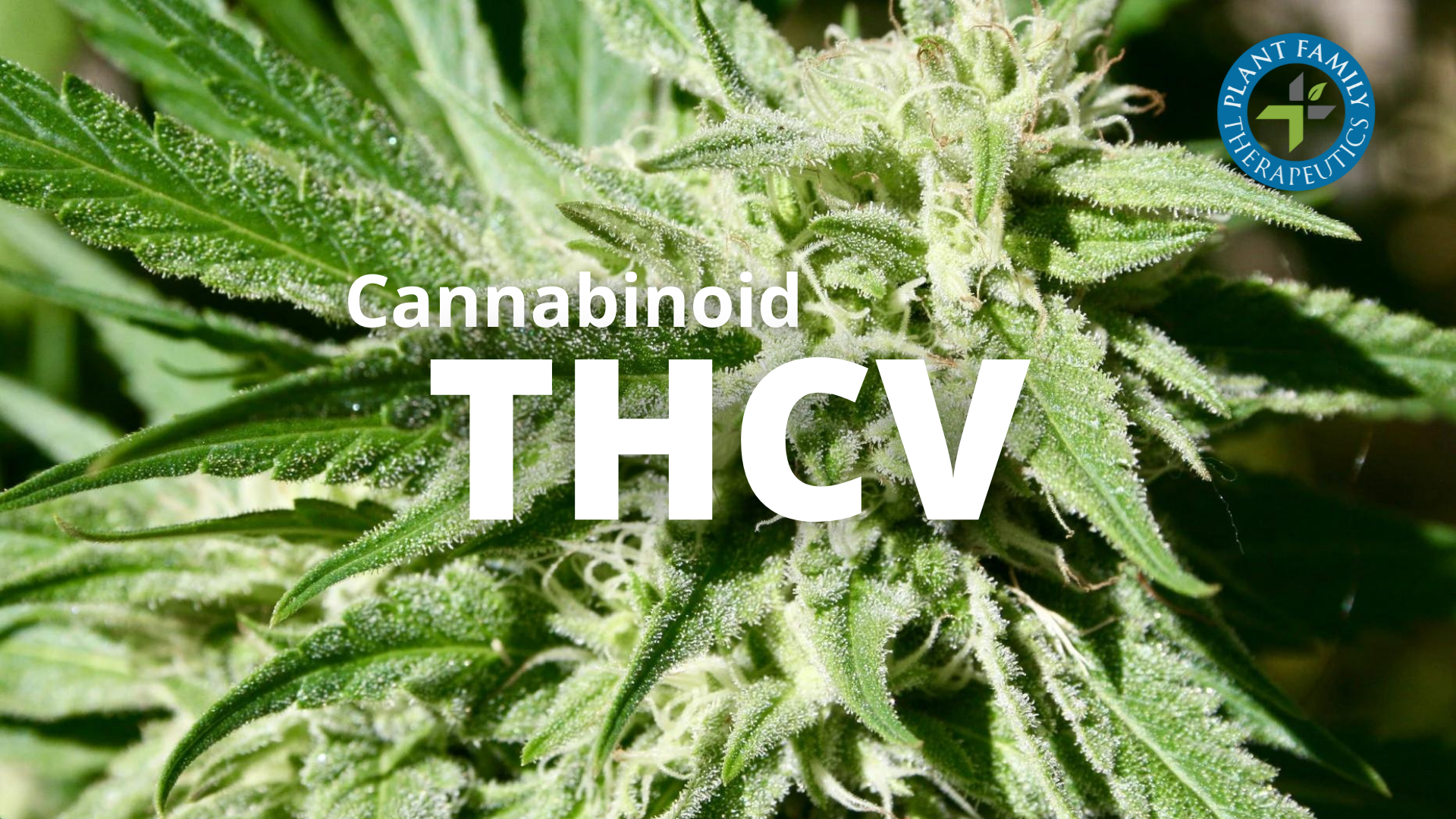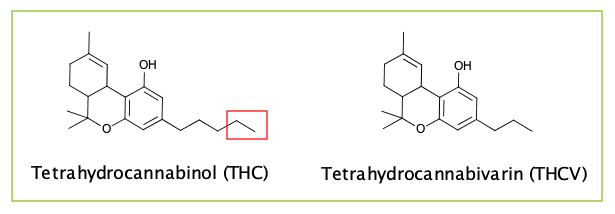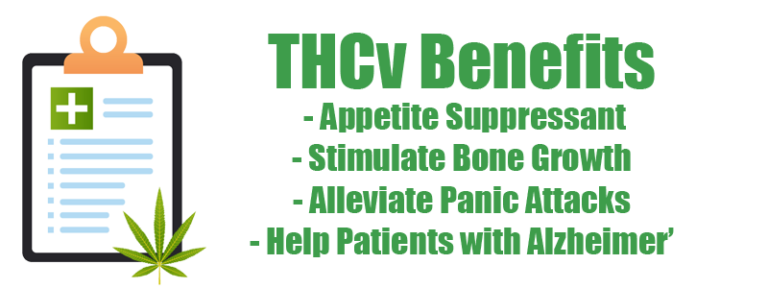This website requires you to be 21 years or older to enter. Please confirm your age below to continue.

What is Tetrahydrocannabivarin or THCV?
THCV is a rare minor cannabinoid found in trace amounts in most strains of cannabis sativa, but predominantly in sativa pure landrace strains such as South Africa’s Durban Poison. It can also be found in hemp and other plants in very small quantities. THCV is a feel-good stimulant that has the potential to aid in weight loss by suppressing your appetite and, bonus provides health benefits too.
Not to be confused with THC
THCV has a subtle molecular variation, the difference being the presence of a propyl (3 carbon) group rather than a pentyl (5 carbon) group, from THC that makes it act differently. It produces similar effects of THC and CBD taken together. The discovery of this cannabinoid containing a sort of ‘combination’ between the effects of CBD and THC shows just how much we have yet to find out about this miraculous plant.
Existing evidence suggests that this variation also means THCV interacts with both CB1 and CB2 receptors in the endocannabinoid system (ECS) but in a different way than THC. THCV acts as both an antagonist (blocks or dampens the effects) and an agonist (activates the receptor to produce response) to the CB1 receptor depending on the concentration.
In low to moderate doses, THCV has none of the psychoactive properties of THC, and can dampen some of the effects THC delivers, such as poor motor control, decreased cognitive function, and even food cravings or “munchies”. In much higher doses, THCV does manifest its own short-lived psychoactive qualities, which are sometimes described as producing a clear-headed, euphoric state of mind. Generally, strains rich in THCV tend to provide a more stimulating response leaving people feeling energized, motivated, and alert.

Let’s explore THCV benefits
If you’ve used cannabis before, you’ve probably experienced the munchies. Unlike THC, which is largely responsible for appetite stimulation, THCV dulls or blocks hunger. Multiple studies have found that THCV is actually good for losing weight. Not only does it curb your appetite and help you manage cravings, but it also boosts your metabolism, giving you more energy and helping you burn off more calories with your daily exercise and activities.
Its ability to inhibit the action of CB1 receptors has made it a particular focus for research into appetite regulation. Research has found that low doses of THCV in the region of 5 to 7.5 milligrams can effectively reduce appetite, while other studies have suggested that the compound may even be able to improve connectivity in certain areas of the brain that are altered in some people with obesity.
Studies have shown that THCV can improve glucose tolerance and help regulate insulin levels to stabilize blood sugar levels. This may help people suffering from Type 2 diabetes. A study from Harvard Medical School reported that people who were using cannabis had lower levels of fasting insulin and insulin resistance, higher HDL-c or “good cholesterol”, as well as smaller waist circumference.
According to the British Journal of Pharmacology, THCV has the ability to block CB1 receptors while activating CB2 receptors simultaneously. Due to this ability, THCV can reduce muscular tremors associated with Parkinson’s disease, Alzheimer’s and ALS, and has also been shown to reduce the brain lesions that occur in the later stages of Alzheimer’s. With these properties, THCV is a strong contender against the progression of Parkinson’s Disease. THCV can delay neurodegeneration, which is one of PD’s most harmful symptoms.
Further evidence reveals that THCV can reduce both the frequency and the severity of seizures,

both as a preventative and when administered during an event. THCV demonstrated antipsychotic effects through the serotonin receptors suggesting a therapeutic potential for schizophrenia.
Studies published demonstrated that THCV can counteract signs of established inflammation and inflammatory pain and inflammation with liver damage caused by oxygen deprivation. This is especially promising for people who have experienced injuries and other disorders that are associated with chronic inflammation like diabetes and Crohn’s Disease. This research strengthens the case for investigating its therapeutic potential for the management of inflammation and inflammatory pain.
THCV may also stimulate bone growth thanks to its ability to promote the production of new bone cells. Studies have found that THCV can stimulate bone nodule formation and collagen production, meaning that it may meaningfully contribute to bone growth.
Because of this, THCV shows a lot of promise in the treatment of bone-degenerative diseases like osteoporosis, although more research is needed.
According to research, THCV may reduce or even eliminate panic attacks. That means it can be effective for patients with PTSD or an anxiety disorder. In general, most scientists concluded that THCV was effective since it suppresses the “panic” mode. THCV doesn’t appear to suppress emotions, only the ability to panic, associated with the fight or flight response.
While more research is needed, current research tells us that THCV is certainly an exciting cannabinoid and one to keep an eye on.
References
Abioye, A., Ayodele, O., Marinkovic, A. et al.(2020). Δ9-Tetrahydrocannabivarin (THCV): a commentary on potential therapeutic benefit for the management of obesity and diabetes. J Cannabis Res 2, 6 (2020). https://doi.org/10.1186/s42238-020-0016-7
Bátkai, S., Mukhopadhyay, P., Horváth, B., Rajesh, M., Gao, R. Y., Mahadevan, A., Amere, M., Battista, N., Lichtman, A. H., Gauson, L. A., Maccarrone, M., Pertwee, R. G., & Pacher, P. (2012). Δ8-Tetrahydrocannabivarin prevents hepatic ischaemia/reperfusion injury by decreasing oxidative stress and inflammatory responses through cannabinoid CB2 receptors. British journal of pharmacology, 165(8), 2450–2461. https://doi.org/10.1111/j.1476-5381.2011.01410.x
Bolognini, D., Costa, B., Maione, S., Comelli, F., Marini, P., Di Marzo, V., Parolaro, D., Ross, R.A., Gauson, L.A., Cascio, M.G. and Pertwee, R.G. (2010), The plant cannabinoid Δ9-tetrahydrocannabivarin can decrease signs of inflammation and inflammatory pain in mice. British Journal of Pharmacology, 160: 677-687. https://doi.org/10.1111/j.1476-5381.2010.00756.x
Cascio, M. G., Zamberletti, E., Marini, P., Parolaro, D., & Pertwee, R. G. (2015). The phytocannabinoid, Δ⁹-tetrahydrocannabivarin, can act through 5-HT₁A receptors to produce antipsychotic effects. British journal of pharmacology, 172(5), 1305–1318. https://doi.org/10.1111/bph.13000
Englund, A., Atakan, Z., Kralj, A., Tunstall, N., Murray, R., & Morrison, P. (2016). The effect of five-day dosing with THCV on THC-induced cognitive, psychological and physiological effects in healthy male human volunteers: A placebo-controlled, double-blind, crossover pilot trial. Journal of psychopharmacology (Oxford, England), 30(2), 140–151. https://doi.org/10.1177/0269881115615104
García, C., Palomo-Garo, C., García-Arencibia, M., Ramos, J., Pertwee, R., & Fernández-Ruiz, J. (2011). Symptom-relieving and neuroprotective effects of the phytocannabinoid Δ⁹-THCV in animal models of Parkinson’s disease. British journal of pharmacology, 163(7), 1495–1506. https://doi.org/10.1111/j.1476-5381.2011.01278.x
Hill, A. J., Weston, S. E., Jones, N. A., Smith, I., Bevan, S. A., Williamson, E. M., Stephens, G. J., Williams, C. M., & Whalley, B. J. (2010). Δ⁹-Tetrahydrocannabivarin suppresses in vitro epileptiform and in vivo seizure activity in adult rats. Epilepsia, 51(8), 1522–1532. https://doi.org/10.1111/j.1528-1167.2010.02523.x
Le Strat, Y., and Le Foll, B. (2011). Obesity and Cannabis Use: Results From 2 Representative National Surveys, American Journal of Epidemiology, Volume 174, Issue 8, 15 October 2011, Pages 929–933, https://doi.org/10.1093/aje/kwr200
Penner, E., Buettner, H., & Mittleman, M. (2013). The impact of marijuana use on glucose, insulin, and insulin resistance among US adults. The American journal of medicine, 126(7), 538-589. https://doi.org/10.1016/j.amjmed.2013.03.002
Romano, B., Pagano, E., Orlando, P., Capasso, R., Cascio, M. G., Pertwee, R., Marzo, V. D., Izzo, A. A., & Borrelli, F. (2016). Pure Δ9-tetrahydrocannabivarin and a Cannabis sativa extract with high content in Δ9-tetrahydrocannabivarin inhibit nitrite production in murine peritoneal macrophages. Pharmacological research, 113(Pt A), 199–208. https://doi.org/10.1016/j.phrs.2016.07.045
Rzepa, E., Tudge, L., & McCabe, C. (2015). The CB1 Neutral Antagonist Tetrahydrocannabivarin Reduces Default Mode Network and Increases Executive Control Network Resting State Functional Connectivity in Healthy Volunteers. The international journal of neuropsychopharmacology, 19(2), pyv092. https://doi.org/10.1093/ijnp/pyv092
Thomas, A., Stevenson, L. A., Wease, K. N., Price, M. R., Baillie, G., Ross, R. A., & Pertwee, R. G. (2005). Evidence that the plant cannabinoid Delta9-tetrahydrocannabivarin is a cannabinoid CB1 and CB2 receptor antagonist. British journal of pharmacology, 146(7), 917–926. https://doi.org/10.1038/sj.bjp.0706414 –